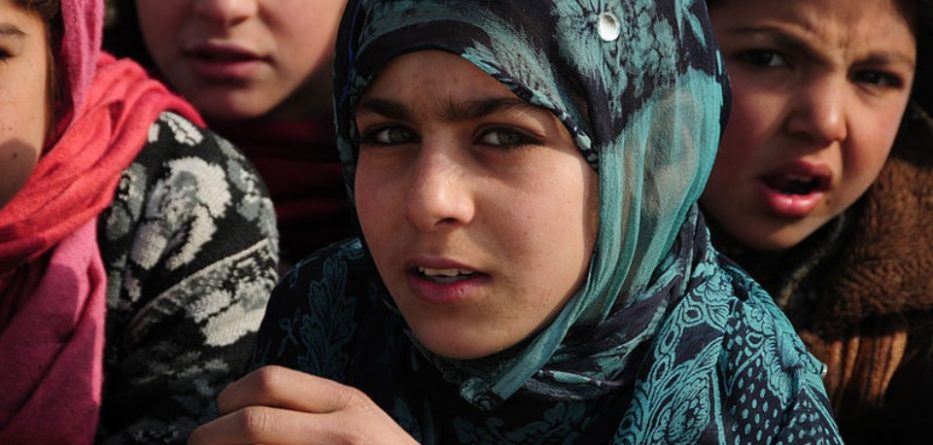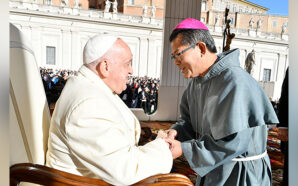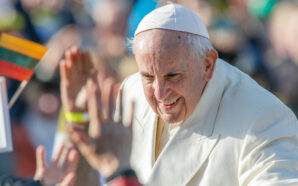Homily for the 21st Sunday in Ordinary Time
Readings: Joshua 24:1-2, 15-18; Psalm 33; Ephesians 5:21-32; John 6: 60-69
21 August 2021
Today we conclude Jesus’ discourse on the bread of life in Chapter 6 of John’s gospel. The going has got tough, not just for those undecided about whether to follow Jesus. Even “many of the followers of Jesus’ decide that enough is enough. They’re off. ‘This is intolerable language. How could anyone accept it?” All this talk about eating his flesh and drinking his blood: “my flesh is real food and my blood is real drink”. “Whoever eats me will draw life from me.” “Many of his disciples left him and stopped going with him.”
Listen at https://soundcloud.com/frank-brennan-6/homily-22821
So Jesus turns to the Twelve. In John’s gospel there are only ever two references to the Twelve – here, and after the resurrection when Thomas is described as being one of the Twelve. Scripture scholar Francis Moloney tells us: “The group plays no significant role in the Gospel’s theology of discipleship, but the grouping of “twelve” within the larger following of Jesus is by now traditional. The author uses it here to differentiate between “many of the disciples” and a smaller group who have come to authentic belief in the word and person of Jesus.”[1]
Put off by Jesus’ symbolic language and otherworldly claims, many of his disciples left him and stopped going with him. They had heard enough. There is just this remnant remaining, those especially chosen by Jesus, and yet even one of them is described there and then by Jesus as “a devil”. He was referring to Judas, “one of the Twelve, who was going to betray him.” Things are grim. Jesus is feeling the crunch as he says to the Twelve, “What about you, do you want to go away too?” As biblical scholar Brendan Byrne says, Simon Peter’s answer “has warmed Christian hearts down the ages”[2]: “Lord, who shall we go to? You have the message of eternal life, and we believe”.
If you’re like me, your heart could do with some warming at the end of a week when COVID lockdowns are being extended, when climate scientists are issuing a Code Red for Humanity, and when a 20 year intervention in Afghanistan is ending with a Taliban victory and everyone wondering what was the point. Think only of that scene at Kabul airport as young people ran up the runway trying to scuttle aboard the undercarriage of the US aircraft about to take off, a couple making it on, only to fall to their deaths minutes later. For 20 years the international community tried to make a difference in Afghanistan – tried to give young Afghans a flight path to peace and security. Year in and year out there were resolutions passed unanimously by the UN Security Council with the loftiest of sentiments and commitments to achieve all manner of things. Unlike the US led operation in Iraq, this was an intervention by the international community with UN backing every inch of the way. The 2001 resolution adopted by all members of the Security Council after the fateful destruction of the World Trade Center by Osama bin Laden’s disciples, called upon “Member States to contribute personnel, equipment and other resources to (an) International Security Assistance Force” and called upon “all Afghans to cooperate with the International Security Assistance Force and relevant international governmental and non-governmental organizations”[3].
As recently as March 2020, the UN Security Council unanimously welcomed “the significant steps towards ending the war and opening the door to intra-Afghan negotiations”. The international community through the UN Security Council welcomed “the intention of all Afghan parties to pursue the successful negotiation of an inclusive political settlement and a permanent and comprehensive ceasefire”, emphasising “the importance of the effective and meaningful participation of women, youth, and minorities”, and affirming “that any political settlement must protect the rights of all Afghans, including women, youth and minorities, and respect the strong desire of Afghans to achieve durable peace and prosperity, and must respond to the strong desire of Afghans to sustain and build on the economic, social, political and development gains achieved since 2001, including adherence to the rule of law, respect for Afghanistan’s international obligations, and improving inclusive and accountable governance”.[4]
Young Afghans on that airstrip knew that 20 years of resolutions from the UN Security Council and 20 years of military commitment by countries like the US and Australia now counted for nothing. If they could not get on that plane, they saw no possibility of freedom or even life itself.
“Who shall we go to?” Afghans know that they can no longer put their faith in the USA. They cannot put their faith in Australia. They cannot put their faith in the United Nations. They are on their own. Only if their homeland once again becomes a breeding ground for the export of terrorism will the international community come knocking. Provided Taliban terrorism is confined to the Afghan population inside Afghanistan, the people of Afghanistan will be left alone, abandoned. Those who co-operated with the international assistance mission these past 20 years will be those most at risk.
This past week, our government’s response to this humanitarian disaster has been woeful. While countries like Canada have pledged to take in 20,000 refugees, we have so far pledged only 3,000, and these are allocated places coming from the already existing annual quota of 13,750 which is unfilled because of COVID. Here in Australia, there are 5,000 Afghans living on temporary protection visas who have no right to sponsor their family members to come to Australia. This past week, our government has resisted calls to give these people who can never return home and whose relatives now face the wrath of the Taliban permanent protection visas and a right of family reunion. Archbishop Mark Coleridge, the President of the Australian Catholic Bishops Conference, has joined the call of many community leaders that our Government match Canada and offer permanent resettlement to 20,000 Afghan refugees now.[5] Why not at the very least offer permanent resettlement to the 5,000 already here and then choose another 15,000 to come from Afghanistan? Like Peter in today’s gospel, these Afghans living in our midst on temporary protection visas are crying, “Lord, who shall we go to? You have the message of peace, freedom and life, and we believe”.
We Australians, like the international community generally, need to accept that our 20-year intervention in Afghanistan followed by this week’s complete withdrawal has created fresh threats to the well being and security of men, women and children in Afghanistan. We followers of Jesus who have stuck by him because we have nowhere else to go – nowhere else to find hope and to nurture love in the midst of a COVID pandemic, a climate Code Red for humanity, and a complete collapse of UN Security Council authority and US power – need to play our part assisting those Afghans within our reach affirming in the words of today’s Psalm that “The Lord is close to the broken-hearted; those whose spirit is crushed he will save.” May God help us. May the bread of the eucharist, the body of Christ, allow us to draw life, hope and love from the one who came down from the Father and who will ascend to where he was before.
[1] Francis Moloney, The Gospel of John, The Liturgical Press, Collegeville, MN, 1998, p. 231.
[2] Brendan Byrne, Life Abounding: A Reading of John’s Gospel, St Paul’s, 2014, p. 127
[3] United Nations Security Council, Resolution 1386 (2001), S/RES/1386 (2001)
[4] United Nations Security Council, Resolution 2513 (2020), S/RES/2513 (2020)
[5] Archbishop Mark Coleridge, Media Release, 20 August 2021, available at https://www.catholic.org.au/acbc-media/media-centre/media-releases-new/2329-increase-afghan-intake-archbishop-coleridge-urges-pm/file
Fr Frank Brennan SJ is the Rector of Newman College, Melbourne, and the former CEO of Catholic Social Services Australia (CSSA).








